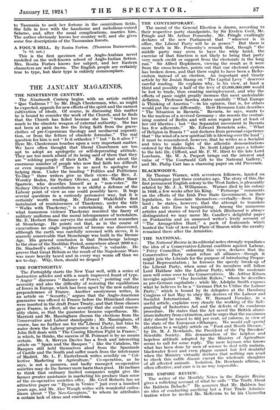THE JANUARY MAGAZINES.
THE NINETEENTH CENTURY.
The Nineteenth Century begins with an article entitled "Quo Vadimus ? " by Mr. Hugh Chesterman, who, as might be expected, appeals for new efforts of the spirit and the earnest cultivation of ideals. Of course, in discussing this matter he is bound to consider the work of the Church, and he finds that the Church has failed because she has "trusted too much to the obsolete weapon of external authority. She has not been at pains to free the living faith from the grave- clothes of pre-Copernican theology and mediaeval supersti- tion, or from the fetters of obsolete formulae." The real question for him is not " Is it orthodox ? " but" Is it alive ? " Here Mr. Chesterman touches upon a very important matter. We have often thought that liberal Churchmen are too apt to adopt an apologetic or self-deprecating attitude. They are too much afraid of its being said of them that they are "robbing people of their faith." But what about the enormous number of people who now find faith too difficult or even impossible ? There is no need to apologise for helping them. Under the heading "Politics and Politicians To-Day" three writers give us their views—the Rev. J. Worsley Boden, Sir Sydney Olivier, and Mr. Walter Shaw Sparrow, who describes himself as a "non-voter." Sir Sydney Olivier's contribution is as skilful a defence of the Labour point of view as one could possibly have. It begs several questions in a curiously persuasive way, but it is certainly worth reading. Mr. Edward Wakefield's first instalment of reminiscences of Thackeray, under the title Walks with Thackeray," is entertaining. It shows with what humorous violence Thackeray resented the finery of military uniforms and the moral intemperance of teetotalers. Mr. E. Herbert Stone surveys the results of recent researches at Stonehenge. He points out that, as in the course of excavations no single implement of bronze was discovered, although the earth was carefully screened with sieves, it is scarcely conceivable that Stonehenge was built in the Bronze Age. His general conclusion is that Stonehenge belongs to the close of the Neolithic Period, somewhere about 2000 B.C. Dr. Shadwell's article, "After Waterloo," is valuable. He proves that Great Britain as the result of the Napoleonic Wars was more heavily taxed and in every way worse off than we are to-day. Why, then, should we despair ?






































 Previous page
Previous page